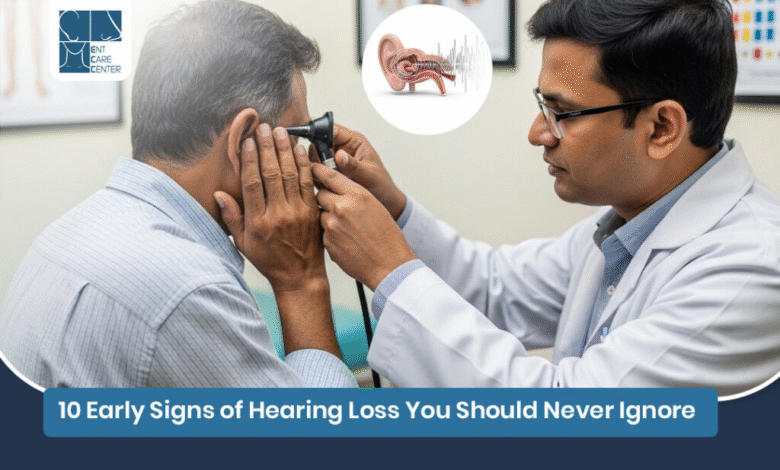Early Signs of Hearing Loss You Should Not Ignore

Hearing plays a central role in how people connect, communicate, and experience daily life. When hearing begins to decline, the change often occurs gradually, making it easy to overlook early warning signs. Recognizing these signals early allows you to seek help before the condition affects communication, safety, and emotional well-being. For residents in Clearwater and surrounding areas, understanding the early signs of hearing loss is the first step toward maintaining a healthy hearing experience and exploring modern hearing aids when needed.
Difficulty Following Conversations
One of the most common early indicators of hearing loss is difficulty following conversations, especially in noisy environments. You may find yourself asking others to repeat words or feeling that people are mumbling even when they speak clearly. Crowded places, such as restaurants or social gatherings, can be challenging because background noise makes it harder to distinguish individual voices.
In the early stages, this difficulty may only appear occasionally, but it can gradually increase over time. Many individuals unconsciously adapt by nodding politely or withdrawing from conversations to avoid frustration. If you notice that you are straining to hear others in group settings or during phone calls, it may be time for a professional hearing evaluation.
Turning Up the Volume More Than Before
Another early sign appears when you frequently increase the volume on the television, radio, or phone. Family members may comment that the sound seems too loud, yet it feels comfortable to you. This discrepancy often indicates that your ears are no longer processing sound evenly across frequencies.
Modern televisions and devices can easily amplify volume, masking early hearing loss by compensating for the decline. However, this adjustment does not address the underlying issue. If you regularly rely on higher volumes, a hearing assessment can determine whether an underlying loss is developing.
Difficulty Hearing High-Pitched Sounds
Hearing loss often affects high-frequency sounds first. You may notice that certain tones, such as birds chirping, children’s voices, or doorbells, seem faint or disappear entirely. This change can occur so gradually that many people do not realize it until others point it out.
High-frequency hearing loss also makes it more difficult to distinguish consonant sounds such as “s,” “f,” or “th,” which can make speech seem unclear. Missing these subtle details can affect understanding even in quiet settings. Early testing can identify these patterns before they begin to interfere significantly with daily communication.
Ringing or Buzzing in the Ears
Tinnitus, the perception of ringing, buzzing, or humming in the ears, is another common sign of early hearing loss. It may occur intermittently or persist throughout the day and night. While tinnitus has many possible causes, it frequently accompanies hearing decline due to noise exposure or age-related changes.
Although tinnitus can be unsettling, effective management options exist. Hearing aids with built-in sound therapy programs, for instance, can reduce the contrast between tinnitus and background noise. Discussing this symptom with a qualified hearing care provider is the best way to determine the underlying cause and explore solutions that bring relief.
Withdrawal From Social Situations
Social withdrawal often follows early hearing changes. When understanding conversation becomes difficult, people may avoid gatherings, phone calls, or group activities out of embarrassment or fatigue. Over time, this isolation can affect confidence and emotional health.
If you find yourself declining invitations or feeling anxious about social events, consider whether hearing challenges may be contributing to those feelings. Addressing hearing loss early not only restores communication but also strengthens social connections and overall well-being.
Fatigue After Listening
Listening fatigue is a lesser-known but common symptom of developing hearing loss. Because the brain must work harder to interpret sounds it cannot clearly detect, extended conversations or noisy environments can feel mentally exhausting. You might end the day feeling unusually tired or overwhelmed after lengthy discussions or meetings.
This fatigue is often misinterpreted as simple stress, but it can indicate that your auditory system is overexerting itself to fill in missing sounds. Modern hearing aids can relieve this burden by amplifying sound more naturally, allowing the brain to focus on comprehension instead of compensation.
The Value of Early Testing and Professional Guidance
Addressing hearing changes early prevents further decline and helps maintain an active, engaging lifestyle. A professional hearing evaluation is painless and straightforward, providing detailed insights into how your ears respond across different frequencies.
If hearing loss is detected, modern hearing aids offer discreet, comfortable solutions that restore clarity without disrupting daily activities. Early use of amplification also keeps the brain engaged in recognizing and processing sounds, which supports long-term hearing health.
Hearing loss often begins subtly, with small changes that gradually affect daily life. Do not ignore signs such as turning up the television, missing parts of a conversation, or feeling tired after social events. Early evaluation and proper treatment restore confidence, communication, and quality of life.
If you live in Clearwater and suspect that your hearing is changing, contact Countryside Hearing Aids. Their experienced team provides comprehensive hearing assessments, personalized fittings, and ongoing support to help you experience clear, comfortable hearing every day.
Read More Trendymag





